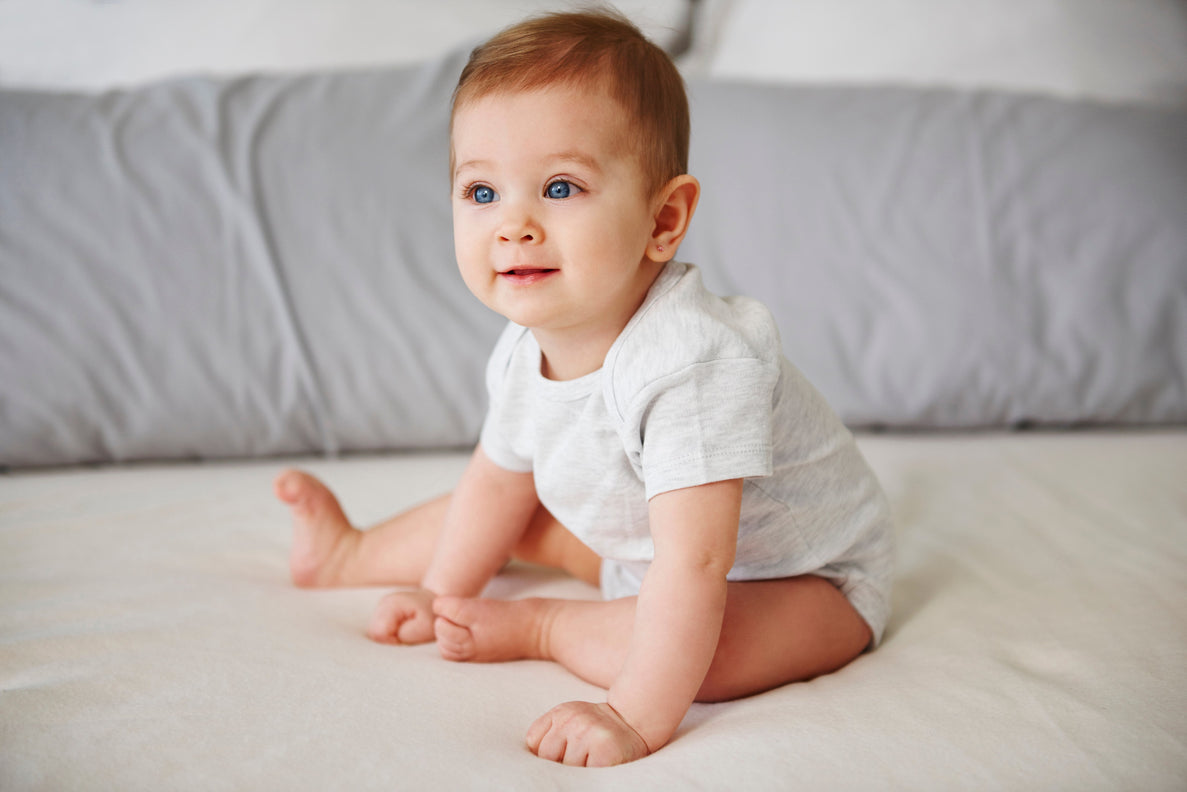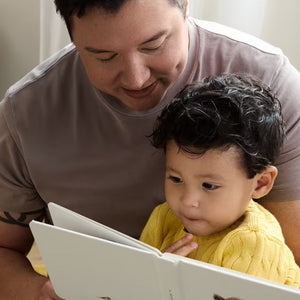Your little one is seven months old. They’re playing more, napping less, and staying awake longer during the day. I’d like to share sample 7 month sleep schedules and answer common sleep questions about wake windows for 7 month olds, dropping naps, sleep regressions, and more. Let’s dive in.
7 Month Sleep Schedule Guidelines
Every baby is unique and your little one’s day will depend on when your baby wakes, how long your baby naps, and individual cues. These age-appropriate guidelines are not intended to be a rigid schedule, simply a guide for setting up a flexible routine.

Text version of Guidelines at 7 Months
| Daytime Feedings: | Every 2.5-3.5 hours |
|---|---|
| Goal Daytime Sleep: | 2.5-3.5 hours |
| Sweet Spot Bedtime: | 7:00-8:00 pm |
| Number of Naps: | 2-3 |
| Wake Windows: | None |
| Goal for 3 naps: | 2-3 hours |
| Goal for 2 Naps: | 2.5-3.5 hours |
For more details on these recommendations, keep reading.
What is a sample sleep schedule for a 7 month old?
Schedules for a 7 month old depend on being responsive to each baby’s individual needs. Your days will vary depending on your little one’s wake time, nap lengths, and wake windows. Here are two sample schedules — one with 3 naps and one with 2 naps — to help you see how a day might play out with a 7 month old.

Text version of 3 Nap Schedule
| Time | Activity |
|---|---|
| 6:00 am | Wake |
| 6:15 am | Feed (breast/bottle) |
| 7:00 am | Solids |
| 8:30 - 9:45 am | Nap 1 |
| 9:45 am | Feed (breast/bottle) |
| 10:30 am | Solids |
| 12:05 pm | Feed (breast/bottle) |
| 12:15 - 1:45 pm | Nap 2 |
| 3:35 pm | Feed (breast/bottle) |
| 4:15 - 4:45 pm | Nap 3 |
| 5:30 pm | Solids |
| 7:05 pm | Feed (breast/bottle) |
| 7:45 pm | Bedtime |
Parents: I want you to notice that this parent was following their baby’s hunger cues. Please be responsive to your baby’s hunger cues as you decide when to offer feedings. If you’re looking for more information on 7 month old feedings, check out this blog.

Text version of 2 Nap Schedule
| Time | Activity |
|---|---|
| 6:30 am | Wake |
| 6:40 am | Feed (breast/bottle) |
| 8:00 am | Solids |
| 9:00 am | Feed (breast/bottle) |
| 9:15 - 10:30 am | Nap 1 |
| 12:00 pm | Feed (breast/bottle) |
| 12:45 pm | Solids |
| 1:30 - 3:30 pm | Nap 2 |
| 3:30 pm | Feed (breast/bottle) |
| 5:00 pm | Solids |
| 6:30 pm | Feed (breast/bottle) |
| 6:45 pm | Bedtime |
Parents: Just like in the 3 nap schedule, I want you to notice that this parent was following their baby’s hunger cues. Please be responsive to your baby’s hunger cues as you decide when to offer feedings. If you’re looking for more information on 7 month old feedings, check out this blog.
What are the recommended wake windows for a 7 month old? How long can a 7 month old stay awake?
Wake windows this month may start in the 2-3 hour range, but will expand to around 2.5-3.5 hours as your baby gets closer to eight months old.
Wake windows can also depend on the time of day. They start on the shorter end of the range, and then increase as the day progresses. For example, your seven month old may do best with a 2.5 hour wake window before the first nap, but may need a wake window of 3-3.5 hours before bedtime.
It’s also common between 7-8 months for babies to show signs it’s time to drop a nap. When your baby transitions from 3 naps to 2, their wake windows will need to increase as well.
Here's a general routine for wake windows at this age if your baby is still taking 3 naps:
-
About 2.5 hours after wake time = Nap 1
-
About 2.5 hours after the end of Nap 1 = Nap 2
-
About 2.5 hours after the end of Nap 2 = Nap 3
-
About 2.5-3 hours after the end of Nap 3 = Bedtime
And here's the routine for wake windows at this age once your baby transitions to 2 naps:
-
About 2.5-3 hours after wake time = Nap 1
-
About 3 hours after the end of Nap 1 = Nap 2
-
About 3-3.5 hours after the end of Nap 2 = Bedtime
How many naps should a 7 month old take?
A seven month old naps 2 to 3 times a day. Our total daytime sleep goal is is between 2.5 and 3.5 hours.
If you’re seeing less than 2.5 hours of total daytime sleep, be sure to check out my blog all about short naps.
Ideally, we want the first 2 naps of the day to be at least an hour, but we don’t want any one nap to exceed 2 hours. This will help ensure your baby has active awake time and that they get enough feedings during the day to help them sleep through the night.
Please Note: If you have a baby in daycare and you’re concerned about your baby’s nap schedule, check out my blog about daycare and baby sleep for more help.
When should the last nap end for a 7 month old?
Most seven month olds will need a 3 to 3.5-hour wake window prior to bedtime. Ending the last nap by 4:30 pm will allow that full wake window and help you hit a sweet spot bedtime of 7:00-8:00 pm.
When do babies drop the 3rd nap?
The average age range for transitioning from 3 naps to 2 is 6.5-7.5 months old.
It may be time to drop the third nap if you see any of these signs:
-
Your baby is having difficulty falling asleep or staying asleep at nap time (when this wasn't a problem before).
-
Your seven month old’s third nap is getting so late it's interfering with bedtime.
-
Early morning wakings begin to appear or reappear because your baby is getting too much daytime sleep.
Keep in mind, nap transitions take time and consistency! It can take 2-4 weeks before your baby has fully transitioned from 3 naps to 2.
Expert Tip: When dropping a nap, we want to stay flexible with bedtime. You can move bedtime as early as 6:00 - 6:30 pm to adjust for missed daytime sleep and maintain a consistent 2 nap schedule (versus fluctuating between 3 and 2 naps).
If you need more help, my Conquering Naps class can walk you through this nap transition as well as help you have a great little napper from now until your child turns 2.
What is the ideal bedtime for a 7 month old?
At seven months old, you still want to aim for the sweet spot bedtime between 7:00-8:00 pm. Babies who regularly have a bedtime after 8:00 pm may struggle to fall asleep, experience more false start bedtimes, and may even have more night wakings or early morning wakings.
Expert Tip: If your seven month old is transitioning from 3 naps to 2, we’ll want to be flexible with bedtime. Just before the transition to 2 naps, bedtime may be slightly after 8:00 pm. After the transition, bedtime may need to be moved as early as 6:00 to 6:30 pm as your baby adjusts to their new nap schedule. As you make bedtime adjustments, just remember the wake window prior to bedtime is 3-3.5 hours.
What are 7 month old milestones?
Each new milestone your baby achieves is so exciting — but every baby is different. So if another seven month old at daycare is sitting independently and your baby isn't, keep in mind that each baby progresses at their own developmental pace. Make sure to speak with your pediatrician if you have any questions or concerns about your baby meeting their milestones.
Physical Milestones
7 month old physical milestones are often broken into two categories: gross motor skills (think: the skills moving towards walking, jumping, etc.) and fine motor skills (think: picking up a piece of cereal, holding a pencil in the future). Some of the physical milestones that you might see at 7 months old are:
-
Sitting independently
-
Getting into a sitting position
-
Transferring objects from one hand to the other more fluidly
-
Supporting their body weight in a standing position when helped by an adult
-
Using a raking motion with their fingers to pick up an object
Cognitive Development
Cognitive development includes problem-solving, communication, and more. Here are some of the cognitive milestones you might see at 7 months:
-
Using their voice to express joy or displeasure
-
Finding partially hidden objects
-
Babbling chains of consonant sounds
-
Banging toys on the floor or table
-
Bringing toys to their mouth
Social Development
Social development includes the skills your baby learns to interact and bond with the people around them. Here are some social milestones at 7 months:
-
Playing near or interacting with others
-
Feeding themself finger foods
-
Grabbing or playing with feet
-
Expressing displeasure around leaving known caregivers
Is there a 7 month sleep regression?
We do often see a sleep regression between 8 and 10 months, but babies can experience sleep “regressions” for many reasons. If your baby’s sleep is suddenly disrupted, please know:
-
Sleep issues at seven months could be a sign it’s time to transition from 3 naps to 2.
-
Developmental strides happening around seven months – from an increase in physical abilities and mobility to emotional and cognitive abilities- can impact sleep.
-
An increase in distracted feedings around seven months affects sleep as well. Minimize distractions during feedings to prevent night wakings caused by hunger.
-
Separation anxiety may also begin to cause sleep problems at seven months.
What are some ideas for activities for my 7 month old?
Most seven month olds love putting objects in and out of a container, stacking objects, and reaching and grabbing toys.
Here are a few examples of what these activities can look like:
-
Place fabric, ribbons, and other objects in a tissue box, shoe box, or empty wipe container for your baby to pull out and stuff back in.
-
Try out Baby’s First Blocks. Though your seven month old is not expected to match the shapes, these blocks will encourage movement as they roll and wobble.
-
Practice crawling skills by placing a toy just out of reach.
-
Need to stretch a wake window? Take a little walk around the block describing what you see and allow your baby to interact with nature (Think touching the grass, smelling the flowers, or pointing at birds.)
I have some favorite toys for seven month olds here.
Is your 7 month old still struggling with sleep?
The 5–24 Month Collection will help! Let me show you how to meet your baby where they are developmentally using a holistic and customizable approach. My classes provide you with the guidance and support you need to navigate sleep regressions, manage nap troubles, work towards consolidated nighttime sleep, and more! It’s never too late to have a great little sleeper.
Still have a 6 month old? Check out 6 month sleep schedules. Already have a 8 month old? I've got you covered with my 8 month sleep schedules.








